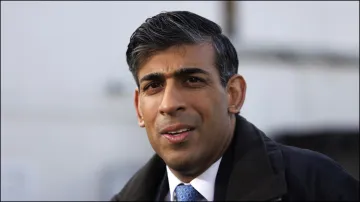UK: Rishi Sunak receives double blow as voters choose Labour Party in two special elections
The party has only won four out of 21 by-elections since the last national election in 2019 and has been defeated six times since Sunak came to power in 2022. This comes as a setback for Sunak, who is under fire to change his policies amid a crumbling economy and a worsening cost-for-living crisis.

London: In a crushing double blow for British Prime Minister Rishi Sunak's government, the Labour Party won two special elections on Thursday in the seats held by Conservatives for years, indicating that the opposition party was on track to win a national election scheduled for later this year. The double defeat shows the growing perils of the governing party as Sunak is under fire from critics within his own party, who have demanded he change course to avoid a defeat in the national polls.
Two Labour Party candidates were elected - Damien Egan won the House of Commons seats of Kingswood in southwest England, and Labour’s Gen Kitchen took Wellingborough in central UK. The Conservatives had won both seats in the 2019 elections but received less support in Thursday's special elections. Additionally, the hard-right Reform UK party came third, putting more pressure on the Tories (Conservatives).
Labour leader Keir Starmer said the results "show people want change", while the results are expected to increase worries within the Conservatives that they are likely heading towards a defeat in the national election after 14 years in power. The Conservatives are lagging 10 and 20 points behind the Labour Party in opinion polls.
One of the two Conservative lawmakers had resigned to protest against Sunak's lack of commitment to green energy. Long-serving Wellingborough legislator Peter Bone was ousted over allegations of bullying and sexual misconduct. "The Tories have failed. Rishi's recession proves that. That's why we've seen so many former Conservative voters switching directly to this changed Labour Party," said Starmer.
More trouble for Rishi Sunak
The Conservatives have now lost ten by-elections since the last general election, more than any administration since the 1960s. That includes six defeats — and one win — since Sunak took office in October 2022. The 43-year-old British PM has struggled to restore his party's sinking popularity despite recasting himself at various points over the past year as a bold reformer, as he is under pressure from members of his own party to offer a more right-wing conservative agenda before the election.
The Conservatives have been in power nationally since 2010, years that saw austerity following the world banking crisis, Britain’s divisive decision to leave the European Union, a global pandemic and a European war that triggered the worst cost-of-living crisis in decades. The falling popularity of the Conservative Party was seen in Thursday's by-election, where Labour's Kitchen won the saeat of Wellingborough by 13,844 votes, described as the Conservative's "worst ever by-election reverse".
The party has only won four out of 21 by-elections since the last national election in 2019. The challenge from the Reform Party adds a new dimension. Senior Conservative lawmaker Jacob Rees-Mogg said at least in Kingswood, if Reform supporters had voted for the governing party as part of the "Conservative family", the Conservatives would have held the parliamentary seat.
With a lower turnout, the voters punished the governing party and Sunak, who is struggling to meet his election promises, including a vow to grow the economy. This came at a particularly bad time as data on Thursday showed the UK had slipped into recession in the second half of 2023. With many voters angry over a punishing cost-of-living crisis, long waiting times to use the state-run health service and strikes on public transport, Sunak is running out of time to close the gap with Labour.
Sunak's critics
The Conservative losses may embolden Sunak’s many rivals in the fractious party, who are already positioning themselves for the leadership contest that would likely follow an election defeat. Some even want to oust Sunak sooner, replacing him with a low-tax, low-immigration right-winger who might win back voters from Reform UK.
Sunak’s only consolation is that Labour is also experiencing turbulence. Last week the party watered down a key green investment pledge, saying the Conservatives had left the economy too weak to honor the commitment. Starmer also is struggling to stamp out allegations of antisemitism within the party. This week the party disowned its candidate for another special election after he reportedly mentioned that Israel allowed Hamas' October 7 attack as a pretext to invade Gaza.
Critics say it’s evidence Labour has not rooted out the antisemitism that festered under previous leader Jeremy Corbyn, a staunch supporter of the Palestinians and a critic of Israel. It’s unclear whether the controversy has hurt Labour in opinion polls, which show it leading the Tories with a comfortable margin.
(with inputs from agencies)
ALSO READ | UK economy enters recession in second half of 2023 after shrinking 0.30 per cent